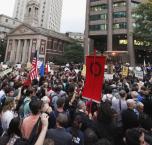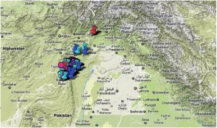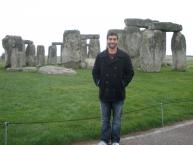 |
What is "Occupy"? A Conflict Analysis PerspectiveThe advent of unexpected forms ofsocial conflict challenges conflict analysts to answer two hard questions. The first is “What’s really going on here?” What are the underlying causes, current dynamics, likely outcomes, and possible options for resolving this conflict? The second is, “Why have these events surprised us?” Since we are conflict analysts, why didn’t we see this struggle coming and recommend creative ways to deal with it? The answers to these queries are closely related, but let’s start with the issue of surprise. An uncomfortable fact: new eruptions of large-scale social conflict almost always take most academic experts and policymakers by surprise. Virtually no one anticipated the... |
 |
S-CAR Doctoral Graduates in the FieldThe hallway conversations are always fun when we hear from colleagues and students of another academic job offer for one of our grads. We even enjoy bemoaning—not-so-veiled bragging—the “burdensome” task of submitting letters of recommendation to university search committees. These personal exchanges, along with the timing of the important upcoming 30-year celebration of our School’s existence, raises the obvious questions: where are our PhD graduates, and have they been doing since graduation? We were the first conflict resolution graduate program standing as an independent academic field. Today, S-CAR is one of only three standalone academic institutions housed within a university,... |
 |
The S-CAR Practice ProjectPractice has occupied a special place in the field of conflict analysis and resolution since its very inception. Practice has also been an integral component of the S-CAR legacy. Multiple conflict resolution initiatives have been carried out by faculty members who have been engaged in practice in a plethora of ways. The S CAR Practice Project emerged from a realization that, despite the continuous engagement of our faculty in conflict resolution work, a comprehensive ‘map’ of S-CAR practice had been missing. Equally absent has been a systematic way of communicating practice both within and outside our community. As a result, practice has remained unnoticed and partially recognized and appreciated. For these reasons, Dean Andrea Bartoli and a number of faculty suggested the initiation of the S-... |
 |
Working in the Field (If They Let You In)On February 9th, the Central Asia, Africa and Latin America Working Groups co-hosted a conference, “Working in the Field (If They Let You In): The Many Challenges Conflict Resolution Professionals Face Practicing or Conducting Research in the Field.” The event explored a number of challenges and in particular focused on the issue of ethics in research and practice, assessment of data reliability, and physical dangers of working in the field. The idea for the conference emerged out of discussion among members of the Central Asia Working Group (CAWG) at a time when one member was preparing to leave for Afghanistan and another was exploring literature on corruption in preparation for a course on Conflict and Development. Although the discussion began with an off-the-cuff observation—that most people involved in international work seem to know a cynical or... |
 |
Targeted Killings and the Law of WarI recently had the privilege of attending an event sponsored by The Aspen Institute’s Justice and Society Program entitled, “Targeted Killings and the Law of War.” The roundtable discussion brought together leading experts in law and foreign policy, each of whom addressed whether and how U.S. and international law apply to the practice of targeted killings. It was obvious from the nature of the questions and a quick glance through recent headlines that drone strikes would dominate the debate– rightfully so given the onset of the new, advanced technology and the ease with which it can be utilized on (and off) the battlefield. So far, drone strikes have reportedly been... |
 |
Shane Smith, CAR StudentShane Smith, a junior from Dallas, TX, has been interested in foreign affairs since high school. After working with two “lost boys of Sudan,” he realized his desire to work in that field, particularly on issues relating to Africa. Initially a government and international politics major, he learned about conflict analysis and resolution while training to be a Mason Ambassador, a student representative of the university tasked with assisting the Admissions office with welcoming and assisting prospective undergraduate students and their families. Attracted to the youth and vitality of the CAR program, Shane changed his major and hasn’t looked back. During the fall semester, Shane was selected by the Center of... |
 |
Ahmad Shami, S-CAR M.S. StudentEducation is a constant theme for Ahmad Shami, a Master’s student at the School for Conflict Analysis and Resolution, at George Mason University. Ahmad believes that "education for Palestinians is a tool of resisting, education is a tool of creating more options and more hope.” Growing up in Ramallah, Palestine, Ahmad studied Business Administration in undergrad but was inspired by the resilience of his grandfather, who lost three sons to the conflict, and who instilled in his family the desire to be involved in peacebuilding and create change especially through education. The Shami Foundation, founded by Ahmad’s family, worked in Beit Ur Al-Tahta Village in the West Bank to develop infrastructure, set up a girls... |



